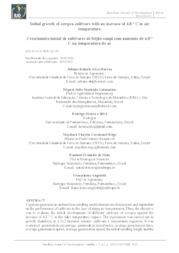Initial growth of cowpea cultivars with an increase of 4.8° C in air temperature.
Initial growth of cowpea cultivars with an increase of 4.8° C in air temperature.
Author(s): BARROS, J. R. A.; GUIMARÃES, M. J. M.; SILVA, R. M. e; RÊGO, M. T. C.; MELO, N. F. de; ANGELOTTI, F.
Summary: Vigorous germination and uniform seedling establishment are determinant and dependent on the performance of cultivars in the face of rising air temperatures. Thus, the objective was to evaluate the initial development of different cultivars of cowpea against the increase of 4.8 ° C in the daily temperature regime. The experiment was carried out in growth chambers, in a 5x2 factorial scheme (cultivars x temperature regimes). It was evaluated: germination percentage, germination speed index, average germination time, average germination speed, average germination speed, the initial seedling length and the initial seedling dry weight. The increase of 4.8 ° C in the temperature did not affect the germination percentage of the seeds, being above 90%. The germination speed index and the average germination speed were higher at temperatures of 24.8-30.8-37.8 ° C. For the germination percentage, the cultivars Pujante, Rouxinol and Tapahium presented the highest indexes, above 90%. The germination speed index and the average germination speed were higher for cv. For Rouxinol, consequently, the average germination time was shorter. The initial seedling length did not differ between cultivars, with an average value of 17.73 cm. The cv. Pujante differed among the other cultivars in terms of seedling dry mass. The initial growth and dry mass of seedlings were higher in the environment with a temperature of 24.8-30.8-37.8 ° C The 4.8 ° C increase in air temperature does not affect the initial phase of cowpea. The germinative parameters of this legume vary according to the cultivars.
Publication year: 2021
Types of publication: Journal article
Unit: Embrapa Semi-arid Region
Observation
Some of Embrapa's publications are published as ePub files. To read them, use or download one of the following free software options to your computer or mobile device. Android: Google Play Books; IOS: iBooks; Windows and Linux: Calibre.
Access other publications
Access the Agricultural Research Database (BDPA) to consult Embrapa's full library collection and records.
Visit Embrapa Bookstore to purchase books and other publications sold by Embrapa.

